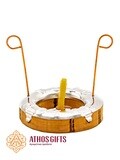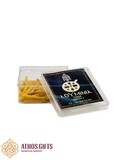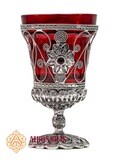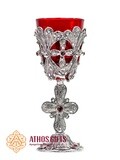Koliva
Koliva (kollyva, kollyba, or kolyvo) is a dish made of whole-grain wheat. Sometimes barley, millet, or rice are used instead. Another ingredients of the koliva are sugar or honey, as well as nuts, dried fruits, breadcrumbs, sesame seeds and pomegranate. The top of the koliva is sometimes decorated with white or silver colored candies.
Each ingredient of koliva has its own symbolic meaning. Wheat grains symbolize a person who, much like a grain, is a child of the earth. We lie down in the earth in order to rise again to eternal life by Lord's mercy. Honey and sugar symbolize the sweetness of Heaven. Raisins represent Jesus Christ, who is the True Vine. The pomegranate symbolizes the splendor and grace of Heaven. Nuts are life, which prolongs itself. Finally, white candy symbolizes bones, which, unlike corruptible flesh, remain unchanged.
How to use
Cover the surface of the koliva with powdered sugar. Then place a seal on top, in the center of the dish. Sprinkle cinnamon in order to capture the pattern of the seal. Finally, remove the seal as carefully as possible, in order to not disturb the pattern.
John the Baptist
The birth of St. John the Baptist was a miracle, for he was born into the family of an elderly barren couple. The description of this event can be found in the Gospel of Luke. John becomes aware of the birth of even while still in his mother's womb, when the Virgin Mary, having received the Annunciation, visits her relative Elizabeth, who was already in the late stages of pregnancy.
From that moment on, John's whole life is devoted to the Lord. He lives in the desert, leading an ascetic life. He is called the Baptist because even before baptizing Christ, he fervently preached to people, urging them to repent and be baptized. As the Forerunner, he is the last prophet of the Old Testament and prepares the way for the coming of the Messiah. When Jesus appears before him to receive baptism, John immediately recognizes him, leading to the well-known dialogue in which Christ commands John to fulfill God's will and baptize Him.
John's passionate preaching, calling people to repentance and stigmatizing the sinful life of the Jewish rulers, became the occasion for his arrest by Herod Antipas. Herod was unlawfully living with his brother's wife Herodias. At the celebration of Herod's birthday, Herodias' daughter Salome, at her mother's instigation, coaxed the king into promising to behead John the Baptist.
In the Orthodox Church, there are several feasts dedicated to the memory of John the Baptist – from his conception to the finding of his Honorable Head. In Greece, numerous folklore traditions are associated with his personality and activities.
Similar Products
Light a candle
You can light a candle in the monasteries of St. Athos
Submit a note
Submit a memorial note to the monasteries of Athos
Mount Athos Shop
Handmade products by the monks of Holy Mount Athos
Transportation on Mount Athos
Book a vehicle for travelling on Holy Mountain
Diamonitirion
Obtain a visa to the Holy Mountain. Guarantee of issuance
Athos cruise
A tour along the west coast of the Holy Mountain on a cruise ship
Submit tamas
We will deliver your tamas to the icon of your choice




